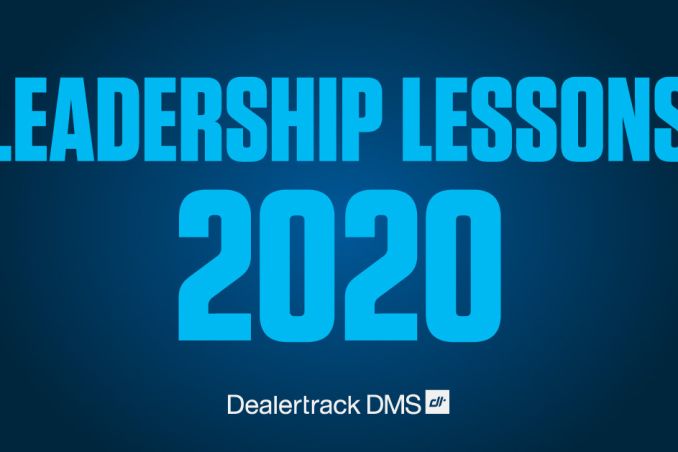By Tyler Anderson
Your dealership saw big technology changes in 2020. My team at Dealertrack DMS, backed by the power of Cox Automotive, shared the experience with our dealer partners as they navigated new, more streamlined business operations. Our team also partnered with some of the industry’s top technology leaders to bring best-in-class solutions that provide innovative retail sales tools, advanced people management software, and powerful payroll systems. It was a big, big year for change. That being said, I don’t see things slowing down in 2021. In fact, with 75% of franchise dealerships switching to digital sales operations last year alone, according to a Cox Auto Sentiment Survey, I think the disruption is only beginning.
More change is coming, and if you take your foot off the gas now, you’re going to get left behind. Many dealers were able to exceed the expectations of their customers in an exceptionally challenging year. With NADA and the Cox Auto Experience just around the corner, I think the best is yet to come. Here are my top technology trend predictions for the year.
Enhanced Cybersecurity
While more dealers made the move to digital platforms and connected technology, they also became more vulnerable to threats from ransomware attacks and phishing. Ignoring the need for enhanced cybersecurity, better training, and IT support is seriously risky. In the case of one dealership who had all of their data held hostage by a simple phishing scam, the total cost was around half a million dollars! Better awareness, more support, and regular monitoring could have saved that dealership hundreds of thousands of dollars. I predict that some dealers will learn the hard way that a lack of training and support can lead to an expensive lesson in 2021.
One-to-One Marketing & Personalization
Now that you’ve moved much of the shopping experience to a digital platform, the last thing you want is to lose the heart and soul of your dealership. No one wants to do business with a robot, so you’re going to need to work with vendors who specialize in building a one-to-one, personalized buying experience. The last time a salesperson left my name off an email and referred to me as “Dear [valued customer],” was probably the last time I did any serious business with them. In 2021, dealers should consider data-driven technology that offers personalized payment portals, better user experiences, and service recommendation software that enables shoppers to find what they’re looking for faster.
Customer Communication Tools
You wouldn’t let a customer leave your dealership without greeting them, so why would you let them leave your website without making sure they find what they’re looking for? Studies have shown that buyers spend an average of only 15 seconds on your website before they leave. And that figure is going down! That doesn’t just mean you need to build a better web experience for new buyers. It also means you’ll need to invest in smarter AI tools and chat features that facilitate faster answers to questions, service repair status features, appointment and scheduling options, at-home applications and payment options, etc. This extends to your phone and text options, too. I can easily tell how far away my pizza delivery order is or look at snow reports before I hit the ski slopes on my phone. Can you tell your customers that it’s time for an oil change and when to make an appointment? Better yet, can they do this from their phone?
Remote Transactions
Everything in 2020 went remote, from schools and learning to the corporate office. I’m as eager to return to work as the next person, but the fact is, certain remote capabilities are here to stay. For dealers in 2021, technology trends will likely focus on making it easier for the consumer to complete their transactions from mobile devices and remote options. Adding to that, paperless payments, remote logins, and any feature that reduces the amount of time spent going through the financing process is going to be key. No one enjoys spending extra time at the dealership than needed. When things go back to “normal,” no one will be willing to sit in your dealership any longer than necessary to complete the F&I process if they can do it online at your competitor.
Integrated Technologies
Just two years ago, it took seven disparate systems for dealers to complete a transaction at the average dealership. That number is likely to grow as digitization continues to impact your dealership. But, unless all your tools and systems can “speak the same language,” and integrate with each other, you’re in for a bad year. Duplicate data-entry will slow down your workforce, and manual re-entry doubles the risk of human error with each disconnected system. Integration fees, plus the impact of lost productivity, add up fast. Consider Payroll. My team is working every day to find solutions that reduce these extra steps and bridge the gaps between our dealer partners’ technologies. We don’t have to build all the software ourselves, either. By partnering with best-in-class technology providers, we can seamlessly integrate those solutions with your dealership’s DMS to connect with your data making life—and the job—easier for everyone.
Onboarding at Scale
According to a Cox Auto Dealership Staffing Study, the turnover rate for frontline salespeople is as high as 80%. That means, on average, eight out of every ten sales people, will leave your dealership every year. This unsustainable loss has an enormous impact on your ability to maintain a consistent experience for customers, as well as a giant impact on your bottom line. According to Hireology’s Adam Robinson, there’s a “strong correlation between structured onboarding processes and employee retention. When new hires take part in a structured onboarding process, 66% of them are likely to remain with a company for longer than three years.”1 While dealers in 2020 were dealing with furloughs and layoffs, in 2021, we’re likely to see a rapid increase in hiring for new talent. And, now that things look very different in your dealership, you’re going to need to get your new hires onboarded—possibly remotely—and on the path to productivity much faster. I predict that in 2021, dealers will need to rely on strong Human Resource partners to help them identify top talent and onboard their teams in larger numbers to combat the high cost of turnover.
Better Business Insights
Dealerships are drowning in data. Your CRM may be full of up to 20 years of old customer data that’s hardly relevant. And your Dealer Management System (DMS) could be sending you reports that might as well be written in code. There’s no point in investing in technology that just adds more unused data to the pile. If the technology at the center of your dealership doesn’t provide insights and opportunity for forecasting, tracking KPIs, and meaningful information, then you need to consider making a change. A critical component of your DMS should be its ability to optimize your business insights and improve profitability. I predict in 2021 we will see dealers searching for laser-focused insights from the technology at the heart of their business.
Advanced Payroll Capabilities
And building on that data, mentioned above, I see dealerships benefiting greatly from advanced Payroll technologies that free-up the often convoluted reporting that slows down month-end processing. Through better integrations and more insightful data, new Payroll solutions are making it easier to manage the back-end of your business. Anyone running the people-side of the automotive business can tell you that running Payroll, Accounting, and Human Resources, across multiple rooftops (and often across state lines) finds themselves running a complex network of reporting algorithms, taxes, and unique payment structures. The more streamlined and connected your Payroll processing is, the more productive the back office becomes. While it might be difficult to quantify in dollars saved, when your Payroll processing wins back eight hours each month because your technology can better manage things like Tech Time, your productivity greatly benefits.
Greater Trust in Automotive
While I know that “trust” itself is not a technology per say, as our industry continues to adapt and become more automated, trust cannot be overlooked. First, our buyers and partners are putting an enormous amount of trust in our hands each and every time they do we move a part of the buying process online. This goes beyond just the Personally Identifiable Information (PII) data access or the transfer of funds. In the exchange for person-to-person shopping, a buyer’s trust that they are getting honest and accurate figures when you quote a price on a vehicle or service should be treated with extreme caution. If a buyer makes the trip, in person, to see a car listed in your online inventory, will it be present—and in the absolute, exact condition listed—at your dealership? Or, are we adding one more step of obfuscation to the experience? This also extends to the safety measure dealers promise their community. Now, with COVID cases again on the rise, can a buyer truly trust that you are doing everything in your power to provide a clean, safe, protected experience?
The technology you use to drive your dealership should help you make smarter business decisions and improve the way your team operates on a day-to-day basis. And in many cases, one technology impacts another. Every trend listed above shares some degree of crossover further highlighting the importance of integration, unification, and collaboration. Your entire workforce may take on new roles this year, blurring the lines between departments that were siloed in the past while some tasks are delegated to third parties. Things are always changing in our business. I know our team is tirelessly working to provide new solutions that deliver smarter, faster, simpler workflows. And, we’ll continue to share these with you, our dealer partners, the minute they’re ready.
1Automotive News: “Dealership turnover squeezing profits: NADA study spotlights struggles in recruitment and retention




